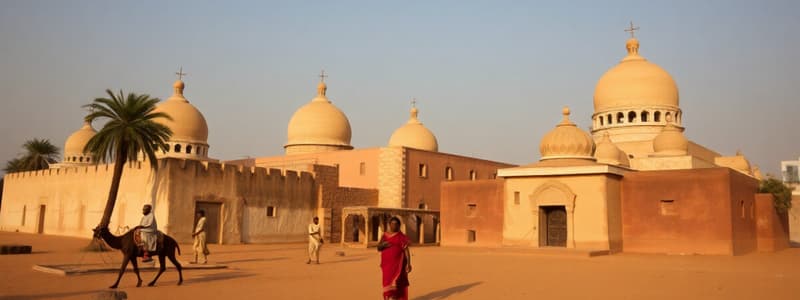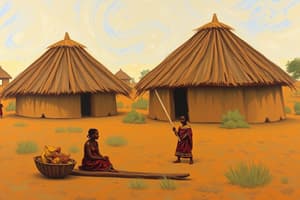Podcast
Questions and Answers
Ibn Battuta's Rihlah is a primary source for understanding West Africa between 1000 CE and 1300 CE because it provides what?
Ibn Battuta's Rihlah is a primary source for understanding West Africa between 1000 CE and 1300 CE because it provides what?
- An account of the political strategies employed by European powers in their conquest of African territories.
- A detailed record of daily life, trade practices, and political structures as observed by a traveler. (correct)
- Analysis of the religious transformations that led to the decline of traditional African beliefs.
- Archaeological evidence supporting the existence of advanced iron smelting techniques in the Ghana Empire.
Which of these factors contributed most significantly to the Ghana Empire's initial rise to power?
Which of these factors contributed most significantly to the Ghana Empire's initial rise to power?
- Strategic alliances with neighboring kingdoms, ensuring peace and stability across the region.
- The introduction of advanced agricultural techniques that led to a population boom.
- The establishment of a centralized banking system that facilitated international trade.
- The development and control of iron smelting, enabling the production of superior weaponry. (correct)
How did the kings of the Mali Empire ensure the stability and prosperity of their realm?
How did the kings of the Mali Empire ensure the stability and prosperity of their realm?
- By establishing a permanent army, dividing the empire into provinces, and revitalizing the gold and salt trade. (correct)
- By converting the entire population to Islam, thus unifying the empire under a common religious identity.
- By constructing an extensive network of paved roads to facilitate the movement of goods and armies.
- By implementing a uniform currency system based on gold reserves, standardizing trade practices.
What was a consequence of the Mali Empire becoming a center for culture and education?
What was a consequence of the Mali Empire becoming a center for culture and education?
Which of these factors contributed to the decline of both the Ghana and Mali Empires?
Which of these factors contributed to the decline of both the Ghana and Mali Empires?
Flashcards
Ibn Battuta
Ibn Battuta
A famous African-born Arab traveler whose travelogue, the Rihlah, provides much of our knowledge of West Africa between 1000 CE and 1300 CE.
Ghana Empire
Ghana Empire
A West African trading empire (c. 830-1235 CE) known for its iron smelting and powerful warriors.
Iron Smelting
Iron Smelting
Melting raw ore to extract the metal.
Mali Empire
Mali Empire
Signup and view all the flashcards
University of Timbuktu
University of Timbuktu
Signup and view all the flashcards
Study Notes
- Much of what is known about West Africa between 1000 CE and 1300 CE comes from the Rihlah, a travelogue by Ibn Battuta.
- Ibn Battuta was a famous African-born Arab traveler.
- Key kingdom states of this timeframe were the Ghana and the Mali Empires.
Ghana Empire
- The Ghana Empire was a trading empire in West Africa from about 830 to 1235 CE.
- The empire used iron smelting to produce iron swords.
- Iron smelting is the act of melting down raw ore to extract metal.
- Iron swords allowed Ghanian warriors to conquer much of the Western Sudan.
- Ghana means both 'warrior king' and 'king of gold.'
- The Ghana Empire fell around the year 1235 CE when outsiders became interested in conquering its wealthy lands.
Mali Empire
- The Mali Empire controlled most of present day Mali, as well as much of Mauritania and Senegal.
- Powerful kings of Mali created a permanent army.
- The empire was divided into provinces.
- The gold and salt trade was rebuilt.
- The Mali Empire was wealthy and also a center for culture and education.
- It was home to the University of Timbuktu, asserted to be the world's oldest university.
- The Mali Empire fell around the year 1600.
- Weak rulers and lessened European interest in Africa, due to exploration of the Americas, contributed to the fall.
Studying That Suits You
Use AI to generate personalized quizzes and flashcards to suit your learning preferences.




